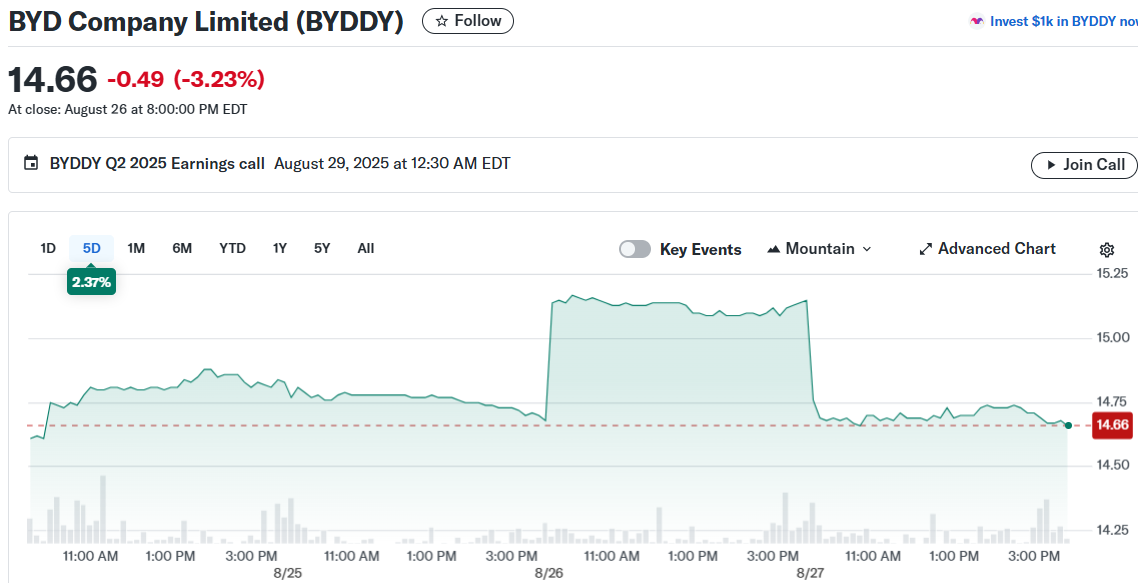TLDR
- BYD plans to sell half its vehicles outside China by 2030, building its own fleet of cargo ships for international delivery
- BYD outsold Tesla in Europe for July 2025, with registrations tripling to 13,503 units while Tesla fell 42% to 6,600 units
- The company invested $500 million in four cargo ships to control its own logistics and avoid shipping bottlenecks
- Tesla’s European decline comes despite overall EU electric vehicle sales rising 39% in July
- BYD stock trades at $15 per share, considered low compared to Tesla’s valuation despite rapid growth trajectory
BYD Company continues its march toward global dominance in the electric vehicle market. The Chinese automaker has set an ambitious target to sell half its vehicles outside China by 2030. This represents a major shift for a company that has spent years building its reputation primarily in its home market.

The numbers from Europe tell a compelling story. In July 2025, BYD registered 13,503 vehicles across Europe, including the UK and other associated countries. This figure represents more than triple the registrations from the same month in the previous year.
Tesla faced a different reality in the same market. The American EV maker saw its European registrations drop by more than 42% to just 6,600 vehicles in July. This decline marks another month of weakness for Tesla in the region.
BYD Takes Control of Its Supply Chain
The most telling sign of BYD’s global ambitions comes through its shipping strategy. While most automakers rely on third-party logistics companies, BYD is building its own fleet of seven cargo ships. Four of these vessels cost approximately $500 million to construct.
This investment allows BYD to deliver vehicles directly to Europe and South America. The company can now avoid costly shipping delays and eliminate middleman fees that eat into profit margins.
BYD operates these ships alongside traditional shipping contracts. This dual approach gives the company flexibility while building toward complete logistics independence.
The company has shown strategic thinking in its market approach. When the European Union imposed higher tariffs on China-built electric vehicles, BYD pivoted to shipping plug-in hybrids instead. This flexibility helped the company maintain its European presence despite trade tensions.
BYD also shifted some manufacturing focus toward Turkey. The country offers lower costs and more favorable trade rules compared to other European locations. The company slowed plans for operations in Hungary as part of this strategic realignment.
Market Conditions Favor BYD’s Expansion
Global demand for electric vehicles continues to grow across key markets. South American EV sales nearly doubled in Brazil during the first half of 2025. This makes Brazil the fastest-growing EV market in the region.
Asian markets also show strong appetite for electric vehicles. Sales across Asia jumped over 40% in 2024 compared to 2023. Consumers in these markets are increasingly choosing more affordable EV models.
Western Europe logged record-breaking EV registrations. Better charging infrastructure and the arrival of more budget-friendly models drove this growth. The overall EU battery-electric vehicle market rose 39% in July alone.
Tesla’s European Challenges Mount
Tesla’s struggles in Europe extend beyond a single month. December 2023 was the last time Tesla posted growth in the European region. Even that growth was modest at just 5.9%.
The timing of Tesla’s European decline creates additional pressure. The company’s second-quarter net income fell 16% from the previous year. Management has been updating its vehicle lineup to reignite demand.
Tesla faces competition from multiple Chinese automakers in Europe. State-owned SAIC Motor also outsold Tesla in July. This shows how aggressively Chinese companies are expanding with lower-cost vehicles that still offer modern features.
Other established automakers managed to grow in the rising European market. Volkswagen logged growth while Tesla lost market share. This suggests Tesla’s problems stem from competitive pressures rather than overall market conditions.
Recent Production and Sales Data
BYD experienced its first production decline in over a year during July. Vehicle production fell 0.9% compared to the same month in 2024. This ended a 16-month streak of uninterrupted growth.
Sales remained slightly positive on a month-over-month basis. BYD saw a 0.6% increase in July compared to June. However, this growth rate was much lower than the 12% month-over-month increase the company achieved in June.
These figures demonstrate that even successful companies face occasional setbacks. BYD’s overall trajectory remains positive despite the temporary production dip.
Geopolitical Factors and Future Plans
Trade tensions continue to create challenges for Chinese automakers. BYD halted plans for a major factory in Mexico due to concerns about U.S. trade policies. The company must navigate complex international relationships as it expands globally.
European and North American tariff concerns remain ongoing issues. However, BYD has shown ability to adapt its strategy when faced with these obstacles.
The company builds reliable, value-priced electric vehicles that undercut traditional automakers. BYD vehicles still deliver modern features that consumers expect from contemporary EVs.
BYD stock currently trades at $15 per share. This price point appears low compared to Tesla’s valuation, especially considering BYD’s rapid growth and global expansion plans. The company has maintained steady revenue growth and increasing shipments over the past five years.






